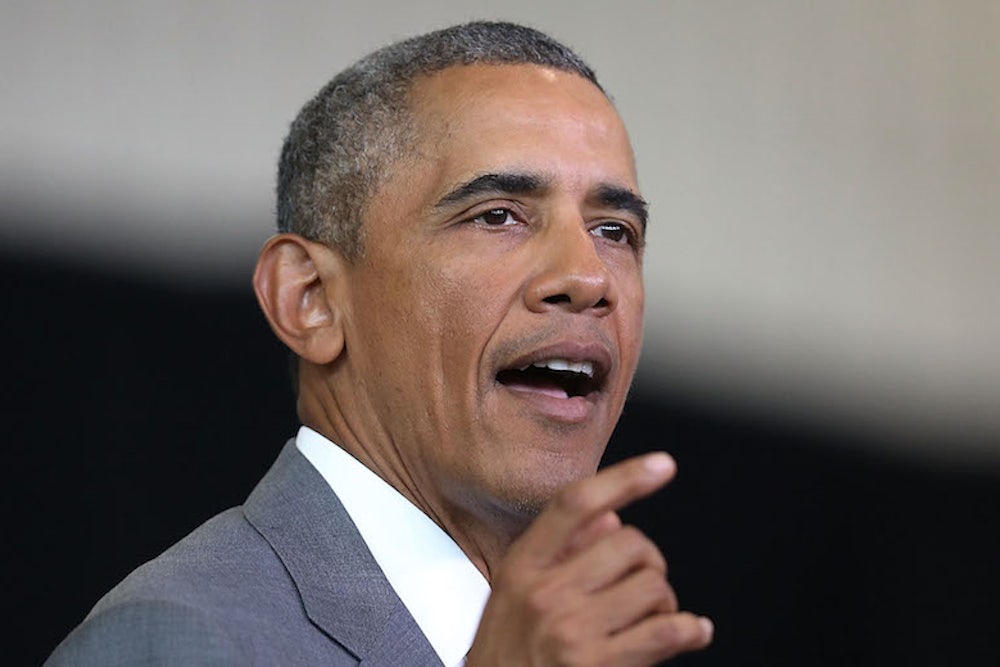President Barack Obama's historic Alaska trip this week, part of his ongoing efforts to highlight the devastating effects of climate change, will take him further north than any sitting president has traveled before. While there, he will speak at a conference of arctic nations, visit the village of Kotzebue, 26 miles north of the Arctic circle, and officially rename the country's tallest mountain from Mt. McKinley to Denali. The trip is intended to build on a string of environmental announcements this summer and generate support in the run-up to the major international climate change conference in Paris in December.
Yet the trip may not be quite as effective as the administration hopes. There are the predictable conservative attacks on Obama’s climate plans, of course, and his decision to rename Mt. McKinley. What Obama may not have anticipated, however, are the attacks from the left.
Obama's appearance in Alaska draws attention to the greatest weakness in his environmental agenda. While he's done more than any president to slow demand for fossil fuels, his green critics say he hasn’t done enough to limit the supply of oil, gas, and coal. Nothing exposes the tension more than the White House recently giving a green light to Shell to explore the Arctic for oil. By going to Alaska to highlight the impacts of climate change, Obama has awkwardly drawn attention to his conflicting actions.
Last Monday, Obama declared that “after decades in which our addiction to fossil fuels and foreign oil perennially threatened our planet and our national security,” his administration and allies have put America on a corrective path. Many environmentalists would disagree.
The Natural Resources Defense Council, which just weeks ago was praising Obama’s historic steps to tackle climate change, wants Obama to declare the Arctic off limits to oil and gas drilling. “It’s the worst place for him to talk about climate,” Niel Lawrence, director of the NRDC's Arctic program, said in a phone call. “It spotlights the way leaders don’t stand up to oil. I think it’s a failure of policy.”
“It is somewhat of a contradiction,” said Margaret Williams, manager of the World Wildlife Fund’s Arctic program, of Obama’s decision on Shell. Had he rejected Shell’s plan to drill, “it would have reinforced what residents and conservation groups and scientists all over the world say: It is too risky,” she said.
Progressive company Credo Action has also launched a campaign calling Obama’s Alaska trip his “Mission Accomplished” moment, a reference to George W. Bush’s premature celebration of success in Iraq.
Obama’s decision to drill could also reverberate in other countries. The president has led the world in piecing together a climate change deal to finally curb greenhouse gasses, but Arctic drilling undermines his own campaign, Lawrence said. “I think the administration understands the urgency of climate change, but by validating the Shell leases and by talking about new leases it’s undercutting the demands he’s making and sending exactly the wrong message to other world leaders—that they should go ahead and facilitate the exploration for still more fossil fuels,” he explained.
The future of the climate isn’t the only thing that worries critics. Shell has not exactly proven it is capable of handling the Arctic’s challenges. The company has faced a number of setbacks in its decade-long attempt to explore for oil, which have already set the project back by $7 billion and several years. Even if there are no more mishaps, scientists and activists worry that drilling could disrupt the Chukchi Sea’s rich wildlife of polar bears, walruses, and seals.
On a call with reporters Friday afternoon, Senior White House Adviser Brian Deese defended Obama’s decision on Shell. “It is the president’s view that if we’re viewing oil and natural gas that we’re better positioned to rely on American resources and put in place the highest and stringent safety standards when those resources are used,” Deese said.
That answer could just as easily come from a Republican opponent arguing the case for lifting all restrictions on drilling in the Arctic National Wildlife Refuge. Alaskan Senator and Energy and Natural Resources Chair Lisa Murkowski said something similar in January (while criticizing Obama’s plans not to drill more). The U.S. has “been accessing our domestic reserves, primarily on private and state lands,” she told NPR. “But think about what our potential could be if we are able to access those federal resources. We are a state that has been providing oil to the country for decades now and doing so in an environmentally sound and safe way.”
The point of Obama’s Alaska tour is to emphasize the impacts of climate change to Americans more familiar with raging wildfires and drought out west and flooding in the east. But the U.S. is also an Arctic nation, and it has an opportunity to lead the eight countries that border the Arctic. The region has warmed twice as fast as any part of the world in the last 60 years. As obstacles to drilling melt away, there has been a scramble from across the world for the resources that lie beneath the seabed. Oil production in the Arctic may still be decades away, but Obama is welcoming a dangerous future. The world can’t burn through all its reserves of oil and gas and fight climate change at the same time.
